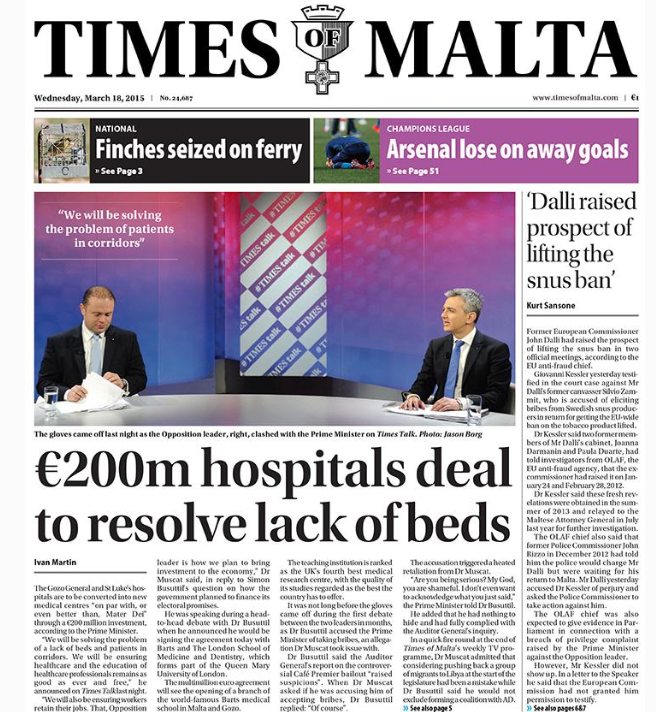€400 million betrayal – 10 years on

In 2015, the Times of Malta front page carried a bold proclamation: then Prime Minister Joseph Muscat heralded a €200 million investment in Malta’s healthcare system. The deal, entrusted to Vitals Global Healthcare (VGH), was supposed to revolutionize three public hospitals—St Luke’s, Karin Grech, and Gozo General. It was sold to the public as the answer to Malta’s waiting list crisis, the cure for overcrowded corridors, and a much-needed boost to medical services.
Nearly a decade later, the reality is far worse than anyone had feared. Not only did the deal fail spectacularly, but it has also become one of the biggest scandals in Malta’s political history. The hospitals were handed over to a company with no prior experience in healthcare management, which, instead of delivering on its contractual obligations, eventually offloaded the concession to Steward Healthcare in what was later described in court as a pre-planned fraudulent arrangement. And instead of costing €200 million, the National Audit Office (NAO) confirmed that taxpayers were actually burdened with a staggering €400 million bill—with nothing to show for it.
A Web of Deception and Collusion
From the outset, there were serious doubts about the viability of the project. VGH repeatedly failed to meet its obligations, missing key investment milestones and failing to deliver the promised upgrades. The entire operation soon unraveled, revealing a network of financial mismanagement and collusion at the highest levels.
A National Audit Office investigation later confirmed what many had long suspected: the entire process had been rigged from the start. The NAO established that there had been collusion between the government and VGH before the concession was even awarded. This means that what was presented to the public as an open, competitive process was, in reality, a pre-determined handover of public hospitals to private interests.
When Steward Healthcare took over, they too failed to deliver, later admitting that the contract was “unenforceable” due to hidden debts and obligations. In a landmark ruling, Judge Francesco Depasquale struck down the deal, describing it as a fraud on the people of Malta. The ruling vindicated years of concerns raised by journalists, whistleblowers, and civil society organizations, yet it also left taxpayers with a bitter truth: €400 million had been squandered with nothing to show for it.
Political Accountability and the Cost to the Public
The scandal raises fundamental questions about accountability and governance in Malta. Who was responsible for vetting VGH before handing them control of vital national infrastructure? Why were warning signs ignored, and why did successive governments continue to defend the deal even as it fell apart?
Beyond the legal and political fallout, the impact on Malta’s healthcare system is devastating. The promised investment never materialized, waiting lists remain long, and scenes of patients on stretchers in corridors are still a reality. Meanwhile, public funds that could have been used to strengthen the healthcare system have instead disappeared into a black hole of corruption and mismanagement.
The Road Ahead
With the court ruling now in place, the focus must shift to ensuring justice and preventing similar scandals in the future. The Maltese public deserves full transparency on where the money went and who was responsible. If wrongdoing is confirmed, those involved must be held to account—whether they were in politics, business, or public administration.
Most importantly, Malta must rebuild trust in public institutions. Large-scale privatization projects must be subject to rigorous scrutiny, and contracts affecting essential services should not be shrouded in secrecy. The Steward-VGH scandal is a lesson in what happens when political convenience, corporate greed, and institutional failure override the public interest. It is now up to the institutions—and ultimately the people—to ensure that such a betrayal never happens again.
